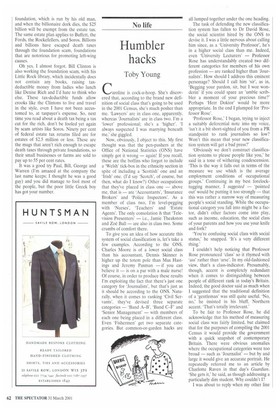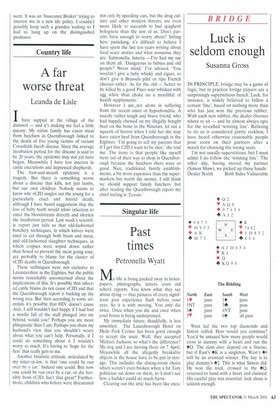Humbler hacks
Toby Young
Caroline is cock-a-hoop. She's discovered that, according to the brand new definition of social class that's going to be used in the 2001 Census, she's much posher than me. 'Lawyers' are in class one, apparently, whereas 'Journalists' are in class two. I'm a 'lower' professional; she's a 'higher'. 'I always suspected I was marrying beneath me,' she giggled.
Now, obviously, I object to this. My first thought was that the pen-pushers at the Office of National Statistics (ONS) have simply got it wrong — again! If you recall, these are the boffins who forgot to include a 'Welsh' tick-box in the ethnicity section in spite of including a 'Scottish' one and an 'Irish' one. (I'd say 'Scotch', of course, but then, what do I know?) Other occupations that they've placed in class one — above me, that is — are 'Accountants', 'Insurance Brokers' and 'Police Inspectors'. As a member of class two. I'm level-pegging with 'Nurses', 'Teachers' and 'Estate Agents'. The only consolation it that 'Television Presenters' — i.e., Jamie Theakston and Zoe Ball — are also in class two. Some crumbs of comfort there.
To give you an idea of how accurate this system of social classification is, let's take a few examples. According to the ONS, Charles Moore is of a lower social class than his accountant, Dennis Skinner is higher up the totem pole than Max Hastings and Jeremy Paxman — if you can believe it — is on a par with a male nurse! Of course, in order to produce these results I'm exploiting the fact that there's just one category for 'Journalists', but that's just as it should be according to the ONS. Naturally, when it comes to ranking 'Civil Servants', they've devised three separate categories — 'Band A-13', 'Band C-F' and 'Senior Management' — with members of each one being placed in a different class. Even 'Fishermen' get two separate categories. But common-or-garden hacks are all lumped together under the one heading.
The task of defending the new classification system has fallen to Dr David Rose, the social scientist hired by the ONS to devise it. I was a little nervous about calling him since, as a 'University Professor', he's in a higher social class than me. Indeed, even 'University Lecturers' — Professor Rose has understandably created two different categories for members of his own profession — are ranked higher than 'Journalists'. How should I address this eminent personage? Should I call him 'sir', as in, 'Begging your pardon, sir, but I woz wonderin' if you could spare an 'umble scribbler a moment of your precious time?' Perhaps 'Herr Doktor' would be more appropriate. In the end I plumped for 'Professor Rose'.
'Professor Rose,' I began, trying to inject a suitably deferential note into my voice, 'isn't it a bit short-sighted of you from a PR standpoint to rank journalists so low? Won't this mean that your new classification system will get a bad press?'
'Obviously we don't construct classification systems to please people like you,' he said in a tone of withering condescension. 'This is the way it falls out in terms of the measure we use which is the average employment conditions of occupational groups.' Continuing in my best forelocktugging manner, I suggested — 'pointed out' would be putting it too strongly — that this was rather a narrow way of measuring people's social standing. While the occupational category you fall into might be a factor, didn't other factors come into play, such as income, education, the social class of your parents and how you use your knife and fork?
'You're confusing social class with social status,' he snapped. 'It's a very different thing.'
couldn't help noticing that Professor Rose pronounced 'class' so it rhymed with 'ass' rather than 'arse'. In my old-fashioned view, that's a class-indicator. Presumably, though, accent is completely redundant when it comes to distinguishing between people of different rank in today's Britain. Indeed, the good doctor said as much when I suggested that the traditional definition of a 'gentleman' was still quite useful. 'No, no,' he insisted in his bluff, Northern accent. 'That's totally irrelevant.'
To be fair to Professor Rose, he did acknowledge that his method of measuring social class was fairly limited, but claimed that for the purposes of compiling the 2001 Census it would provide the government with a quick snapshot of contemporary Britain. There were obvious anomalies where the occupational categories were too broad — such as 'Journalist' — but by and large it would give an accurate portrait. He repeatedly referred me to an article by Charlotte Raven in that day's Guardian. 'She gets it,' he said, as though addressing a particularly dim student. Why couldn't I?
I was about to reply when my other line went. It was an 'Insurance Broker' trying to interest me in a new life policy. I couldn't possibly keep such a grandee waiting so I had to hang up on the distinguished professor.



























































































 Previous page
Previous page